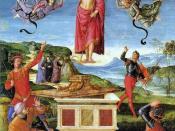1 Corinthians was addressed to the congregation, which was made up primarily of paganism was located in Corinth. At that time, Corinth was a highly urbanized and religiously diverse city, which made it very helpful to the early Christian movement. Paul's first letter to the Corinthians, he was answered numerous questions and demanded numerous changes ranging from: the rich eating with the poor at the church suppers (vv. 11:18-22); to curbing the acceptance of sexual immorality (vv. 5:1-13); to abstaining from taking fellow Christians to court (vv. 6:12-20); to answering the question on the acceptability of eating meat begot from pagan sacrifice (vv. 8:1-13); to the role of women in the church (vv. 11:2-16); to the importance of prophesying (vv. 14:1-40); and much, much more.
Therefore, in the chapter 15 of 1 Corinthians, Paul was "deeply concerned to correct [Corinthians] beliefs about the resurrection, and he suggests that these beliefs do have definite behavioral consequences" (Hays 252).
And the problem is that Corinthians do not believe the resurrection of the dead. In the text, we can see Paul asked to Corinthians that, "now if Christ be preached that he rose from the dead, how say some among you that there is no resurrection of the dead? But if there be no resurrection of the dead, then is Christ not risen" (vv. 15:12-13). Throughout this point, we can see that this problem is a big problem among in Corinthians. It is because if Corinthians does not believe Christ is no resurrection from dead, then it means their preaching is vain, and their faith also is vain. In additionally, it is illogical for them to continue speaking in the name of Christ.
However, we can break chapter 15 down into six parts to analyze each parts and Paul's response in each...


